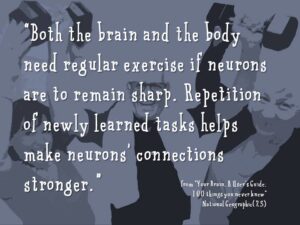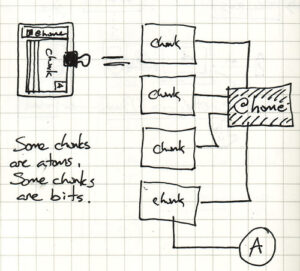By Bruce Carlson
I’ve said for a long time, “I met a lot of new people I use to know.” Whether it’s age or just too many hits in the head, my memory isn’t the greatest. Our move to our new home is reminding me of that even more. What room is the printer in? Where’s the tea? Which cabinet are the dinner glasses in? Where’s the grocery store? How do we get to our son’s house? It seems like a good part of our day is trying to find things.
Unfortunately, GPS has helped when we want to go somewhere. Though there have been several times we thought we knew where we were going, but had to pull out one of our phones to be sure we were on the correct route. So we did a little research on improving our memory the thought we would share it with you. Enjoy the following article on improving your memory.
I remember….
In a groundbreaking study conducted by renowned experts in cognitive neuroscience, a treasure trove of cutting-edge memory improvement techniques has been unveiled. Unlocking the secrets to enhanced recall and retention, these top 10 tips promise to revolutionize how we harness our minds’ power. From mnemonic mastery to mind-boosting exercises, this comprehensive guide is a game-changer for those seeking to supercharge their memory abilities. Prepare to embark on a transformative journey as we delve into the most effective strategies for maximizing your mental prowess. Get ready to unleash the full potential of your memory and experience a whole new level of cognitive brilliance!
Mnemonic Techniques
Mnemonic techniques are powerful tools for improving memory. Acronyms, where each letter represents a word or piece of information, create memorable associations. Visualization involves creating vivid mental images of the information you want to remember. The method of loci, dating back to ancient Greece, utilizes spatial visualization by associating information with specific locations. By employing these techniques, individuals can enhance their memory by creating strong and easily retrievable connections. I’ve tried this, but keep forgetting the acronym.
Adequate Sleep
Sufficient sleep is essential for optimal cognitive function and memory consolidation. During sleep, the brain processes and stores information gathered throughout the day, transferring it from short-term to long-term memory. Research indicates that individuals who get enough sleep are better equipped to recall and retain information. Establishing a consistent sleep schedule and incorporating relaxation techniques before bedtime can help improve sleep quality, leading to enhanced memory capabilities. One benefit of retiring is we don’t set the alarm anymore. Sleeping in is a good thing.
Regular Physical Exercise
Physical exercise not only benefits the body but also has a positive impact on memory and cognitive abilities. Engaging in regular aerobic exercises, such as walking, jogging, or cycling, promotes increased blood flow to the brain. This heightened blood flow delivers essential nutrients and oxygen, supporting the growth and development of brain cells. Additionally, exercise triggers the release of chemicals, such as endorphins and brain-derived neurotrophic factor (BDNF), which play a crucial role in memory formation and retention. We have started to walk the neighborhood, but I know I need to do more.
Healthy Diet
Nutrition plays a significant role in maintaining optimal brain health and memory function. Consuming a balanced diet rich in memory-boosting foods provides the necessary nutrients for optimal cognitive performance. Blueberries, packed with antioxidants and flavonoids, have been shown to enhance brain function and improve memory. Fatty fish, such as salmon or trout, are excellent sources of omega-3 fatty acids, which contribute to brain health. Leafy greens, like spinach and kale, are high in vitamins and minerals that support overall cognitive function. We haven’t changed our eating habits since we moved. I think we eat reasonably well.
Mindfulness and Meditation
Practicing mindfulness and meditation can have a profound impact on memory improvement. Mindfulness involves being fully present and aware of the current moment, reducing distractions, and enhancing focus. This heightened focus aids in encoding and retrieving information, resulting in improved memory. Meditation, on the other hand, trains the mind to cultivate a state of calm and relaxation. Regular meditation practice has been shown to increase gray matter in the brain regions associated with memory, attention, and learning, leading to better cognitive performance and memory retention. This is an area I need to work on. I’ve gotten away from my Qi Gong.
Mental Stimulation
Engaging in mentally stimulating activities is crucial for maintaining a sharp and agile mind. Activities such as solving puzzles, crosswords, and brain teasers challenge the brain and promote neural connections. Reading regularly stimulates the brain, improves vocabulary, and enhances memory. Learning new skills or pursuing hobbies that require mental effort, such as playing a musical instrument or learning a new language, can also help boost memory function. By continuously challenging the brain with new information and experiences, individuals can keep their cognitive abilities sharp and their memory in top shape. I think this is why I enjoy wood carving. It puts me in a calm peaceful state.
Chunking Information
Breaking down information into smaller, manageable chunks is a highly effective technique for memory improvement. The human brain has a limited capacity for processing and retaining information at a given time. By organizing information into smaller, interconnected chunks, the brain can process and store it more efficiently. This approach reduces cognitive load and allows for easier recall. Whether it’s breaking a long number into smaller segments or categorizing information into meaningful groups, chunking helps enhance memory retention and retrieval. Doing one thing at a time is a big benefit for me.
Visualization Techniques
Visualization is a powerful memory enhancement technique that utilizes the brain’s ability to create and recall vivid mental images. By associating information with visual cues, individuals can enhance memory encoding and retrieval. For example, when trying to remember a list of items, mentally visualizing each item in a unique and memorable way can make it easier to recall later. The more detailed and vivid the visualization, the stronger the memory association becomes. Visualization techniques tap into the brain’s visual processing capabilities, leveraging them to improve memory performance. I’m a visually-minded person. Though unless I see it, it’s harder for me to remember.
Organized Routine and Environment
Maintaining an organized routine and environment can significantly impact memory function. A cluttered and disorganized environment can lead to increased cognitive load and difficulty in focusing and remembering important information. By establishing a structured routine and keeping physical spaces organized, individuals can reduce distractions and enhance their ability to process and retain information. Creating dedicated study or work areas with minimal distractions, using calendars or planners to schedule tasks, and employing organizational strategies can help optimize memory performance. I think this is what makes a move so challenging. Everything is in a new place.

Social Engagement
Social interaction plays a vital role in cognitive function and memory improvement. Engaging in meaningful conversations, participating in group activities, and maintaining social connections stimulate the brain and keep it active. Social engagement promotes mental stimulation, exposes individuals to new ideas and perspectives, and challenges cognitive abilities. Research suggests that social interaction may even help reduce the risk of cognitive decline and memory disorders. By staying socially engaged, individuals can support their memory function while enjoying the benefits of human connection. We just starting to get into the social world in our new town.
## Biggest Takeaway: Empower Your Memory for a Brighter Future
In a world where information overload is the norm, taking control of our memory is essential for success. From mnemonic techniques and adequate sleep to regular exercise and a healthy diet, this comprehensive guide has provided a wealth of strategies to enhance memory function. However, the biggest takeaway is the power of a proactive approach. By implementing these memory improvement tips into our daily lives, we have the ability to unlock the full potential of our minds and embrace a future filled with sharper recall, increased productivity, and a heightened cognitive edge. Empower your memory today and pave the way for a brighter tomorrow.
Our house is getting in place and there is a sense of peace in moving around. As we become more settled in our new settings I think I’ll be more able to find my tea. We hope you are enjoying these articles and are willing to continue to follow along as we move through the process of selling our house, buying a new house (to become our home), and the adventures of learning about life in southern Illinois, Bruce & Karen.


